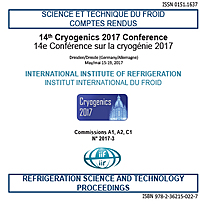
Summary
In our previous research [1], we have identified the potential regimes of flow instabilities such as tip vortex cavitation, backflow vortices at different design and off-design condition for the inducer of a LOX booster turbopump. Cavitation is the development of vapor structures in an originally liquid flow due to localized pressure depression. In general, cryogenic propellants used in modern rocket engines have high vapour–liquid density ratio and with a small latent heat of vaporization are operated close to the thermodynamic critical point. The temperature depression due to the latent heat of vaporization suppresses the growth of cavitation and alleviates cavitation instability in space inducers. Hence, designing a turbopump needs a proper understanding of the cavitation phenomenon. In this paper, an attempt has been made to simulate cryogenic cavitating flow aimed at liquid rocket propulsion applications and to estimate the temperature and pressure profiles for different operating conditions for different fluids. The physical implications of the existing cavitation models are re-examined for the 0.5 caliber hydrofoil from the standpoint of cryogenic fluids.
Available documents
Format PDF
Pages: 8
Available
Public price
20 €
Member price*
Free
* Best rate depending on membership category (see the detailed benefits of individual and corporate memberships).
Details
- Original title: A computational study for characterizing cavitating flow in hydrofoils operating at cryogenic conditions.
- Record ID : 30021759
- Languages: English
- Source: Cryogenics 2017. Proceedings of the 14th IIR International Conference: Dresden, Germany, Mai 15-19, 2017.
- Publication date: 2017/05/15
- DOI: http://dx.doi.org/10.18462/iir.cryo.2017.0072
Links
See other articles from the proceedings (71)
See the conference proceedings
Indexing
-
The transfer of superfluid helium in space.
- Author(s) : DIPIRRO M. J., SHIRRON P. J., TUTTLE J. G.
- Date : 1994/06/07
- Languages : English
- Source: Proceedings of the 15th international cryogenic engineering conference. ICEC 15.
View record
-
High frequency resonance sensors for single- an...
- Author(s) : ARKHAROV A. M., GRECHKO A. G., GLAVATSKIKH S. B., ZHERDEV A. A., EMELYANOV M. G.
- Date : 1995/08/20
- Languages : English
- Source: For a Better Quality of Life. 19th International Congress of Refrigeration.
- Formats : PDF
View record
-
Thermal acoustic oscillations in cryogenic syst...
- Author(s) : GU Y., TIMMERHAUS K. D.
- Date : 1995/08/20
- Languages : English
- Source: For a Better Quality of Life. 19th International Congress of Refrigeration.
- Formats : PDF
View record
-
SQUID et applications : état de l'art.
- Author(s) : DOLABDJIAN C.
- Date : 1997/04/02
- Languages : French
- Source: Cinquièmes Journées de cryogénie et de supraconductivité. Recueil des conférences et posters.
View record
-
What can SQUIDs tell about the human brain?
- Author(s) : KNUUTILA J.
- Date : 2002/07/22
- Languages : English
- Source: Proceedings of the nineteenth International Cryogenic Engineering Conference. ICEC 19.
View record
